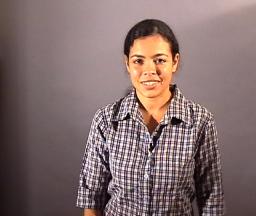
We hear a lot about globalization, about the plight of people who live far far away from us. But the question that nobody ever asks is why we should care so much about people so far from us. It's easy to be kind to our family and our neighbors, but what about people who we will never see? This planet has billions of people on it. How do I choose who to be kind to? Mostly I ignore the ones who are distant, and perhaps that is part of the problem.
Marilena, a simulated factory worker from Tijuana. Marilena is a fake, a fraud, she isn't real. She is a figment of my imagination, produced from books, news stories, movies, even. But she exists (to the extent she exists at all, that is) as an aid to my imagination. It's hard to be kind to abstractions, but it's easy to be kind to Marilena. I can think of Marilena when I'm shopping, and avoid the companies that exploit and abuse her.
So this is what we can do with our technology. We may not be able in reality to bring people closer, but we can pretend to, and sometimes, maybe that's good enough.
If you're using a computer that can see Windows Media File video, you
can meet Marilena and converse with her by clicking on her image
below. For the rest of us, you'll have to simulate the simulation in your
imagination. Remember, the arts are meant to be a stimulus to
imagination. So it's good for you, right?

The show "What Do You Think?" was commissioned for the URI Honors Colloquium on Globalization, during the fall of 2003 (look here). Marilena's web presence was made possible by the Synthetic Interview technology, developed at Carnegie-Mellon University's Human-Computer Interaction Institute, by Dr. Scott Stevens. Dr. Stevens's generous offer of his lab's time and resources is what made this show possible. And Harry Ulrich did the important work of getting Marilena up and running.
The performance end of things had more than ample help from DJ Johnson of In-depth, John Meyers, and, of course, Marilyn Munoz.